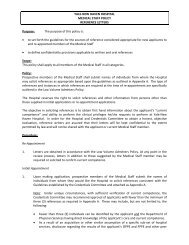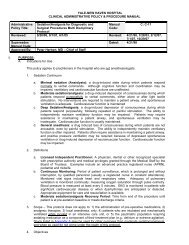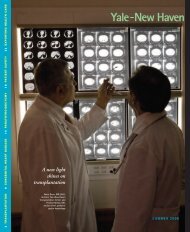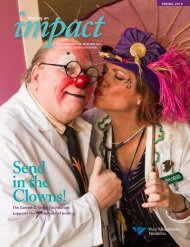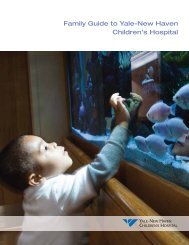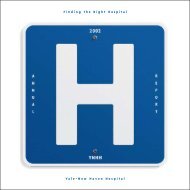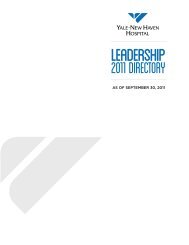Observers - Yale-New Haven Hospital
Observers - Yale-New Haven Hospital
Observers - Yale-New Haven Hospital
You also want an ePaper? Increase the reach of your titles
YUMPU automatically turns print PDFs into web optimized ePapers that Google loves.
Long natural nails and artificial nails have been linked to the transmission of organisms and infections to patients<br />
in healthcare settings. A Natural and Artificial Nail Policy is in effect at YNHH as of October 1, 2004. The policy<br />
applies to all persons in the healthcare setting who have any contact with patients, patient care equipment,<br />
supplies and medications, and those persons involved in the preparation of medication or food. The policy<br />
specifies that natural nails are to ¼ inch or less in length, clean and well manicured, and nail polish, if worn, must<br />
be of a single color and free of cracks and chips. Artificial nails, nail tips, nail jewelry/foreign bodies, rhinestones<br />
and nail sparkles are not permitted.<br />
All HCWs with a potentially transmissible infectious disease (infectious diarrhea, acute respiratory illness, skin infections,<br />
etc.) are expected to exercise appropriate clinical judgment in excluding themselves from direct patient care for the<br />
duration of the potential transmission period. YNHH Occupational Health Services, the Department of <strong>Hospital</strong><br />
Epidemiology, or the Student or Occupational Health Services of <strong>Yale</strong> University should be consulted for individual advice.<br />
The Department of Quality Improvement Support Services (<strong>Hospital</strong> Epidemiology), acting for the YNHH Infection Control<br />
Committee, has the ultimate responsibility for recommendations in such cases.<br />
REPORTABLE DISEASES: The Department of Quality Improvement Support Services (<strong>Hospital</strong> Epidemiology)<br />
will assist physicians in the appropriate reporting of communicable diseases in patients at YNHH to the Local and<br />
State Health Departments. Please call 688-4634 for assistance. During non-business hours please leave a<br />
message with your name, phone number, the patient's name, unit number, ward or clinic and diagnosis.<br />
Hand Hygiene<br />
The single most important thing you can do to protect yourself and your patients.<br />
Before and after each patient contact<br />
After removal of gloves<br />
Alcohol based hand rub<br />
<br />
<br />
<br />
No sink, soap or paper towels needed<br />
Takes less time<br />
Better for your skin<br />
Water is the major ingredient<br />
Contains emollients<br />
For visibly soiled hands or after exposure to blood or body fluids, use soap and water for 15 seconds to cleanse your hands.<br />
Set a good example for your colleagues and other healthcare workers!<br />
10


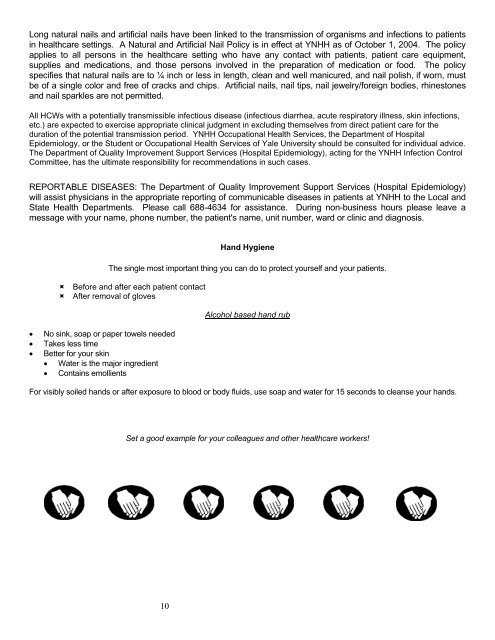
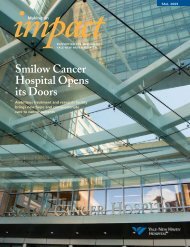

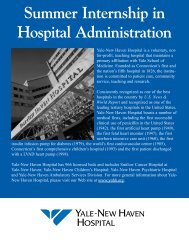
![Annual Report Donor Listings [pdf] - Yale-New Haven Hospital](https://img.yumpu.com/49673575/1/190x245/annual-report-donor-listings-pdf-yale-new-haven-hospital.jpg?quality=85)

